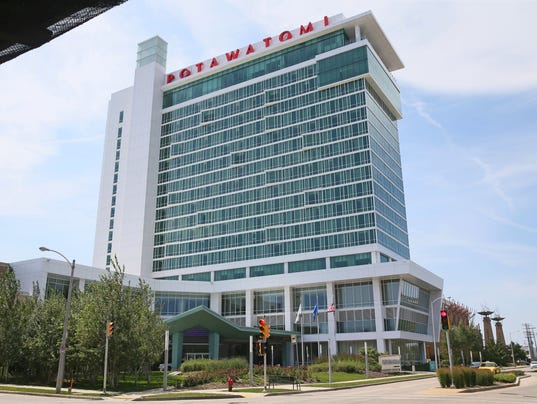Gambling revenue inched up 1.5% in the past year at the Potawatomi tribe's Milwaukee casino, a modest increase that mirrors the trend of flat growth in Midwest markets.
The tribe's net win — that is, the net amount lost by gamblers — at its Milwaukee casino during the 12-month period that ended July 31 is about $400 million according to an estimate based on payments the tribe made to the local and state governments.
The tribe was raking in an estimated $395 million the previous year and $385 million to $390 million in the 12-month period that ended in the summer of 2015.
"The growth is slow by historical standards but at least it's growing again — at least it's not declining," said Mark Nichols, an economics professor at the University of Nevada-Reno.
Gaming revenue at the Menominee Valley Potawatomi casino fell about 3% in the 12-month period that ended in July 2014.
Wisconsin tribes — unlike the owners of non-Indian casinos nationally — are permitted to keep their figures on the amount won at the gaming tables and slot machines confidential. The net win estimate calculated by the Milwaukee Journal Sentinel is based on the payments made by the tribe to state and local governments that are based on the new win at its Milwaukee casino.
For example, the city and county of Milwaukee each received payments of $5.66 million last month compared with a payment of $5.57 million last year and $5.41 million in the summer of 2015. The payment represents 1.5% of the net win at the casino at 1721 Canal St. The figure, however, is calculated after the tribe's payment of about $25 million to the state is deducted from the revenue.
The gambling revenue is also used to make annual payments of about $70,000 to each member of the Forest County tribe.
Frank Fantini, chief executive officer at the respected Fantini's Gaming Report, agreed that the days of rapid revenue growth fueled by the race by state legislatures and tribal governments to open the doors to casinos are long gone.
"The Midwest is pretty much a mature market," Fantini said. "Most of the country now would be a mature market. There aren't too many fresh opportunities"
During the first seven months of this year, gaming revenue was relatively flat — up or down 1% or so — in all of the surrounding Midwestern states, Fantini noted.
Ryan Amundson, a spokesman for the Potawatomi Hotel & Casino, agreed, saying in an email that the "1.5 percent increase in our annual city and county payments indicate a flat-to-modest increase in year-over-year revenue. Those numbers are in line with gaming revenue trends in the Midwest and further reflect a mature regional market.”
Executives at Indian and commercial casinos are continually in the position of having to reinvent their facilities by adding new bells and whistles to existing games or new amenities to the facilities to attract new customers.
In 2015, when the tribe saw a 2.4% increase in its net win, officials credited much of the growth to the opening of a hotel next to the casino.
Now the tribe is betting that adding a new tower with 119 rooms to the 381-room hotel will boost revenue again, Amundson said. "The additional rooms and suites will allow us to accommodate more gaming guests within the regional market," he wrote in the email. The addition is expected to be complete in 2019.
RELATED: Potawatomi Hotel & Casino plans to add second tower with 119 rooms in Milwaukee's Menomonee Valley

The Potawatomi tribe is hoping that an expansion of its existing hotel will boost business at its neighboring casino. (Photo: Peter Malinowski, ©Peter Malinowski/InSite 2014)
The tribe faces significant regional competition as each of Wisconsin's 11 tribes operate casinos and the Ho-Chunk tribe is trying to win state and federal approval to build a gambling hall in Beloit. In addition, all of Wisconsin's neighboring states house commercial and/or Indian casinos.
Casino managers cannot just count on their table games, such as craps and roulette, and slot machines to bring in new customers, Nichols, the economics professor, said.
"That's getting harder because these are more or less the same games," said Nichols, who specializes in studying the gambling industry.
Less than 40% of revenue in Las Vegas casinos is generated by gambling, Nichols said, noting that the figure would have been closer to 60% a decade or so ago.
"They're moving away from being just gambling to being an entertainment destination," Nichols said. "Las Vegas is always having to reinvent itself. ... That's getting harder now" since the basic games of chance remain the same.
Among the shiniest of the potential bells and whistles casino executives are looking at is betting on sporting events, experts say.
Currently, federal law bans sports book in all but four states — Nevada, Oregon, Delaware and Montana. New Jersey is challenging that ban and the US. Supreme Court has agreed to hear the case.
A win by New Jersey could open the floodgates for sports betting nationwide.
"People are really excited about the prospect of sports betting," said Fantini, the newsletter publisher/analyst. "The walls of opposition seem to be crumbling fast."
The profit margins for sports betting "are pretty thin" because it is labor intensive when compared to slot machines, Nichols said.
But, he noted, casino executives could live with the smaller profit because they hope that sports betting would attract people in their 20s and 30s to the casinos. Those patrons may play the slots or roll the dice at a craps table after laying a bet on the Super Bowl.
"It gets people in the door," Nichols said. "That's the big question — how do they get younger people in the casinos."
Read or Share this story: https://jsonl.in/2gxvzzw
| < Prev | Next > |
|---|

